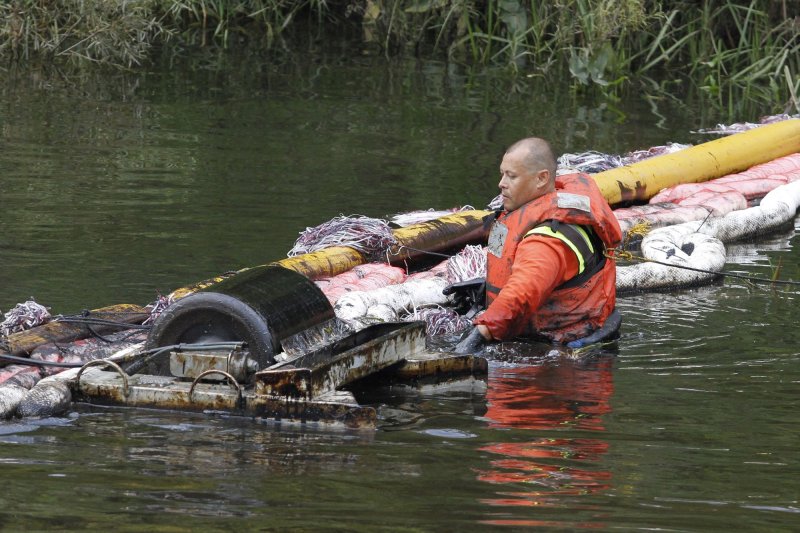A worker tends to an oil boom on the Kalamazoo River near Battle Creek, Mich., in 2010. Pipeline operator Enbridge has been called on to stop sending heavier crude oil grades through a Michigan pipeline network. File Photo by Brian Kersey/UPI |
License Photo
LANSING, Mich., July 15 (UPI) -- A pipeline report from Michigan calls for a ban on the transportation of heavier crude oil grades through pipelines running through the Straits of Mackinac.
"While we recognize the importance of transporting energy to power Michigan communities, it cannot be at the expense of our environment," Michigan Department of Environmental Quality Director Dan Wyant said in a statement.
Wyant and Michigan Attorney General Bill Schuette released a report from a pipeline task force, which calls for "an immediate" ban on sending tar sands and heavy crude through Enbridge pipeline Line 5b running through the straits.
Wyant and Schuette announced last year they'd co-chair the Great Lakes Petroleum Pipeline Task Force to review pipeline concerns in the state, two months after issuing an inquiry to Enbridge about the pipeline network in the Straits of Mackinac.
Two of the state's Great Lakes intersect at the straits, creating a rough maritime environment. The pipeline task force report requires Enbridge to carry full insurance, create a public pipeline safety board and disclose safety reports.
"These recommendations are tough but fair and are clear about responsibilities every Michigan citizen has as a steward of the Great Lakes," Michigan's attorney general said in a statement.
He added that, given the regional environment and other considerations, the pipeline system wouldn't be sanctioned under current requirements. Line 5b is part of the broader Lakehead pipeline system, build by Enbridge in the 1950s.
Line 6b, part of the larger Enbridge network, ruptured near Marshall, Mich., in 2010, dumping more than 25,000 barrels of oil into the surrounding community. More than 30 miles of the region's Kalamazoo River were soiled by the spill, making it one of the worst incidents of its kind.
Line 6b was carrying oil sands from Canadian operations at the time of the incident. That type of oil is heavier than water, causing it to sink and mix with river sediment.
Enbridge Energy and the state of Michigan filed a settlement in May in a county court that requires the company to monitor the environmental impacts of the spill and spend as much as $75 million in restoration and remediation work in and around the Kalamazoo River.
There was no comment from the company on the pipeline task force report. The recommendations set forth in the report require action from Michigan Gov. Rick Snyder, lawmakers and relevant state agencies.















